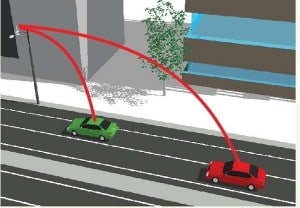 Cohda Wireless will supply its equipment for a trial that will have decide how connected cars will connect with connected roads aka V2X (vehicle to everything), which enables connected cars to interact vehicle-to-vehicle (V2V) or vehicle-to-infrastructure (V2I). Cohda has performed over 800 Dedicated Short Range Communication (‘DSRC’) comparative trials. Cohda Wireless is part of the Smart City Challenge.
Cohda Wireless will supply its equipment for a trial that will have decide how connected cars will connect with connected roads aka V2X (vehicle to everything), which enables connected cars to interact vehicle-to-vehicle (V2V) or vehicle-to-infrastructure (V2I). Cohda has performed over 800 Dedicated Short Range Communication (‘DSRC’) comparative trials. Cohda Wireless is part of the Smart City Challenge.
Clemson University chose Cohda to supply its MK5 onboard and roadside unit hardware and software for the project supported by US Ignite, a White House initiative that is run by the National Science Foundation (NSF).
Clemson will use Cohda Wireless units for the South Carolina Connected Vehicle Testbed (SC-CVT), located along a 10-mile segment of Interstate I-85 near Clemson’s International Center for Automotive Research (ICAR) campus in Greenville South Carolina.
Cohda claims its hardware and software products are used in more than 60 per cent of all V2X field trials worldwide.
When establishing the SC-CVT project, the NSF stated that by the end of the decade, the US Department of Transportation would likely require all new vehicles to be Connected Vehicles (CV), capable of communicating with other vehicles and roadside infrastructure through wireless communications in order to reduce the number of crashes and save lives.
Crash avoidance applications supported by V2V and V2I connectivity exchange safety-critical information such as speed, location and direction of movement to assess the crash risk based on the proximity of vehicles.
The National Science Foundation is an independent federal agency that supports fundamental research and education across all fields of science and engineering.
[graphiq id=”ewV2hg7VsMJ” title=”Clemson University Research” width=”640″ height=”808″ url=”https://w.graphiq.com/w/ewV2hg7VsMJ” link=”http://colleges.startclass.com/l/3882/Clemson-University” link_text=”Clemson University Research | StartClass”]